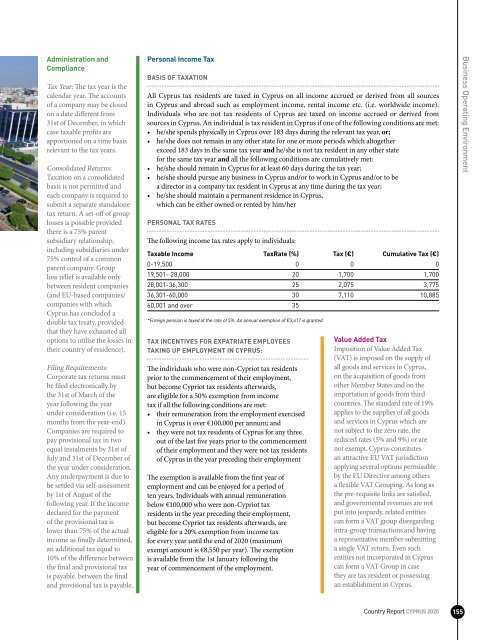2020 Cyprus Country Report
The 2020 Cyprus Country Report features in-depth articles on the economy, foreign direct investment, international trade and headquartering as well as detailed sector profiles and insights from Cyprus’ 100 most influential political, economic and business leaders shaping the future of their country and its industries.
The 2020 Cyprus Country Report features in-depth articles on the economy, foreign direct investment, international trade and headquartering as well as detailed sector profiles and insights from Cyprus’ 100 most influential political, economic and business leaders shaping the future of their country and its industries.
You also want an ePaper? Increase the reach of your titles
YUMPU automatically turns print PDFs into web optimized ePapers that Google loves.
Administration and<br />
Compliance<br />
Tax Year: The tax year is the<br />
calendar year. The accounts<br />
of a company may be closed<br />
on a date different from<br />
31st of December, in which<br />
case taxable profits are<br />
apportioned on a time basis<br />
relevant to the tax years.<br />
Consolidated Returns:<br />
Taxation on a consolidated<br />
basis is not permitted and<br />
each company is required to<br />
submit a separate standalone<br />
tax return. A set-off of group<br />
losses is possible provided<br />
there is a 75% parent<br />
subsidiary relationship,<br />
including subsidiaries under<br />
75% control of a common<br />
parent company. Group<br />
loss relief is available only<br />
between resident companies<br />
(and EU-based companies/<br />
companies with which<br />
<strong>Cyprus</strong> has concluded a<br />
double tax treaty, provided<br />
that they have exhausted all<br />
options to utilise the losses in<br />
their country of residence).<br />
Filing Requirements:<br />
Corporate tax returns must<br />
be filed electronically by<br />
the 31st of March of the<br />
year following the year<br />
under consideration (i.e. 15<br />
months from the year-end).<br />
Companies are required to<br />
pay provisional tax in two<br />
equal instalments by 31st of<br />
July and 31st of December of<br />
the year under consideration.<br />
Any underpayment is due to<br />
be settled via self-assessment<br />
by 1st of August of the<br />
following year. If the income<br />
declared for the payment<br />
of the provisional tax is<br />
lower than 75% of the actual<br />
income as finally determined,<br />
an additional tax equal to<br />
10% of the difference between<br />
the final and provisional tax<br />
is payable. between the final<br />
and provisional tax is payable.<br />
Personal Income Tax<br />
BASIS OF TAXATION<br />
All <strong>Cyprus</strong> tax residents are taxed in <strong>Cyprus</strong> on all income accrued or derived from all sources<br />
in <strong>Cyprus</strong> and abroad such as employment income, rental income etc. (i.e. worldwide income).<br />
Individuals who are not tax residents of <strong>Cyprus</strong> are taxed on income accrued or derived from<br />
sources in <strong>Cyprus</strong>. An individual is tax resident in <strong>Cyprus</strong> if one of the following conditions are met:<br />
• he/she spends physically in <strong>Cyprus</strong> over 183 days during the relevant tax year, or;<br />
• he/she does not remain in any other state for one or more periods which altogether<br />
exceed 183 days in the same tax year and he/she is not tax resident in any other state<br />
for the same tax year and all the following conditions are cumulatively met:<br />
• he/she should remain in <strong>Cyprus</strong> for at least 60 days during the tax year;<br />
• he/she should pursue any business in <strong>Cyprus</strong> and/or to work in <strong>Cyprus</strong> and/or to be<br />
a director in a company tax resident in <strong>Cyprus</strong> at any time during the tax year;<br />
• he/she should maintain a permanent residence in <strong>Cyprus</strong>,<br />
which can be either owned or rented by him/her<br />
PERSONAL TAX RATES<br />
The following income tax rates apply to individuals:<br />
Taxable Income TaxRate (%) Tax (€) Cumulative Tax (€)<br />
0-19,500 0 0 0<br />
19,501- 28,000 20 1,700 1,700<br />
28,001-36,300 25 2,075 3,775<br />
36,301-60,000 30 7,110 10,885<br />
60,001 and over 35<br />
*Foreign pension is taxed at the rate of 5%. An annual exemption of €3,417 is granted.<br />
TAX INCENTIVES FOR EXPATRIATE EMPLOYEES<br />
TAKING UP EMPLOYMENT IN CYPRUS:<br />
The individuals who were non-Cypriot tax residents<br />
prior to the commencement of their employment,<br />
but become Cypriot tax residents afterwards,<br />
are eligible for a 50% exemption from income<br />
tax if all the following conditions are met:<br />
• their remuneration from the employment exercised<br />
in <strong>Cyprus</strong> is over €100,000 per annum; and<br />
• they were not tax residents of <strong>Cyprus</strong> for any three<br />
out of the last five years prior to the commencement<br />
of their employment and they were not tax residents<br />
of <strong>Cyprus</strong> in the year preceding their employment<br />
The exemption is available from the first year of<br />
employment and can be enjoyed for a period of<br />
ten years. Individuals with annual remuneration<br />
below €100,000 who were non-Cypriot tax<br />
residents in the year preceding their employment,<br />
but become Cypriot tax residents afterwards, are<br />
eligible for a 20% exemption from income tax<br />
for every year until the end of <strong>2020</strong> (maximum<br />
exempt amount is €8,550 per year). The exemption<br />
is available from the 1st January following the<br />
year of commencement of the employment.<br />
Value Added Tax<br />
Imposition of Value Added Tax<br />
(VAT) is imposed on the supply of<br />
all goods and services in <strong>Cyprus</strong>,<br />
on the acquisition of goods from<br />
other Member States and on the<br />
importation of goods from third<br />
countries. The standard rate of 19%<br />
applies to the supplies of all goods<br />
and services in <strong>Cyprus</strong> which are<br />
not subject to the zero rate, the<br />
reduced rates (5% and 9%) or are<br />
not exempt. <strong>Cyprus</strong> constitutes<br />
an attractive EU VAT jurisdiction<br />
applying several options permissible<br />
by the EU Directive among others<br />
a flexible VAT Grouping. As long as<br />
the pre-requisite links are satisfied,<br />
and governmental revenues are not<br />
put into jeopardy, related entities<br />
can form a VAT group disregarding<br />
intra-group transactions and having<br />
a representative member submitting<br />
a single VAT return. Even such<br />
entities not incorporated in <strong>Cyprus</strong><br />
can form a VAT Group in case<br />
they are tax resident or possessing<br />
an establishment in <strong>Cyprus</strong>.<br />
Business Operating Environment<br />
<strong>Country</strong> <strong>Report</strong> CYPRUS <strong>2020</strong> 155

















